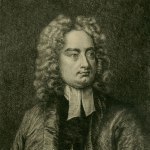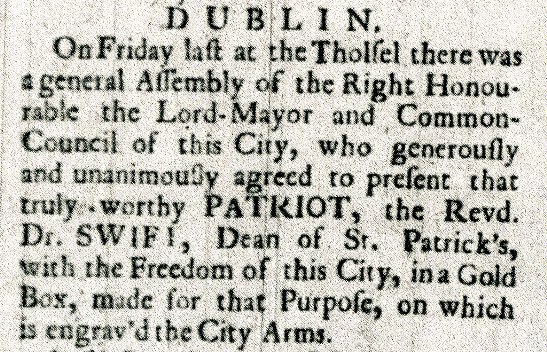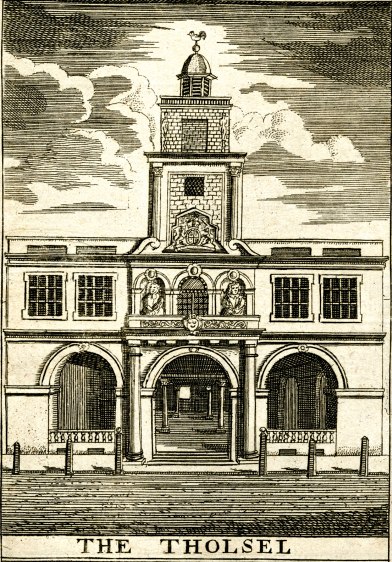Jonathan Swift: freeman of Dublin
Published on 17th January 2017
 In the winter of 1729 – 1730 Jonathan Swift, Dean of St Patrick’s Cathedral, Dublin, was awarded the freedom of Dublin city by special grace. This was the highest honour the city could bestow on him. Members of Common Council put forward the resolution which was agreed unanimously at the Christmas quarterly assembly in 1729. In the citation, quoted in Faulkner’s Dublin Journal on 17-20 January 1729/30, Swift was named as ‘that truly worthy Patriot’.
In the winter of 1729 – 1730 Jonathan Swift, Dean of St Patrick’s Cathedral, Dublin, was awarded the freedom of Dublin city by special grace. This was the highest honour the city could bestow on him. Members of Common Council put forward the resolution which was agreed unanimously at the Christmas quarterly assembly in 1729. In the citation, quoted in Faulkner’s Dublin Journal on 17-20 January 1729/30, Swift was named as ‘that truly worthy Patriot’.
Image right: Engraved portrait of Swift
Faulkner’s Dublin Journal, 17-20 January 1729/30.
Why did he receive this honour? The council was made up of guild officers representing the artisans, merchants and traders of the city. Swift became the spokesman for merchants and tradesmen of Dublin thanks to his pamphlets opposing trade restrictions which applied to Ireland. He wrote A proposal for the universal use of Irish manufacture, in which he advocated purchasing Irish produce and burning ‘all things that came from England except her people and her coal’. He opposed the copper coinage, called Wood’s halfpence, which was circulated in Ireland in the early 1720s, in a series of pamphlets written anonymously using the pseudonym M. B. Drapier, and which became known as the Drapier’s letters. There was universal opposition to the coinage as it was feared that it would devalue Irish coinage and ruin the Irish economy, and Swift articulated the fears of many. He became known as the Hibernian Patriot for these writings.
Image of the Tholsel: Charles Brooking, A map of the city and suburbs of Dublin, 1728.
Swift was admitted as freeman of Dublin on Friday 13 January 1730 and the freedom parchment was presented to him in a gold box engraved with the city arms. It was presented to him at the Tholsel with full ceremony at a general assembly of the Lord Mayor and Common Council of the city. The Tholsel, or City Hall, was situated at the corner of Skinner Row and Nicholas Street, across the street from the Four Courts and Christchurch Cathedral, and just uphill from St Patrick’s Cathedral. It was the administrative headquarters of the city, where the Lord Mayor, Aldermen and Common Council of the city held their meetings.

Dublin Assembly Roll, 1729-30, Calendar of Ancient Records of Dublin, Volume VII, p.476
See Also:

